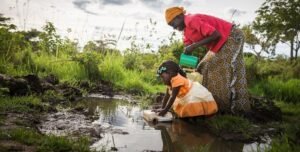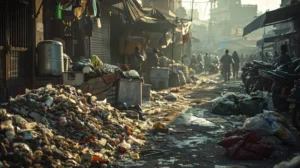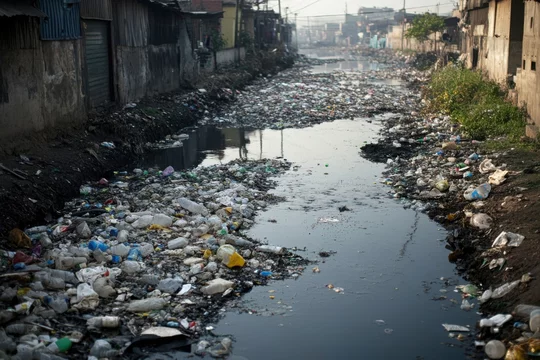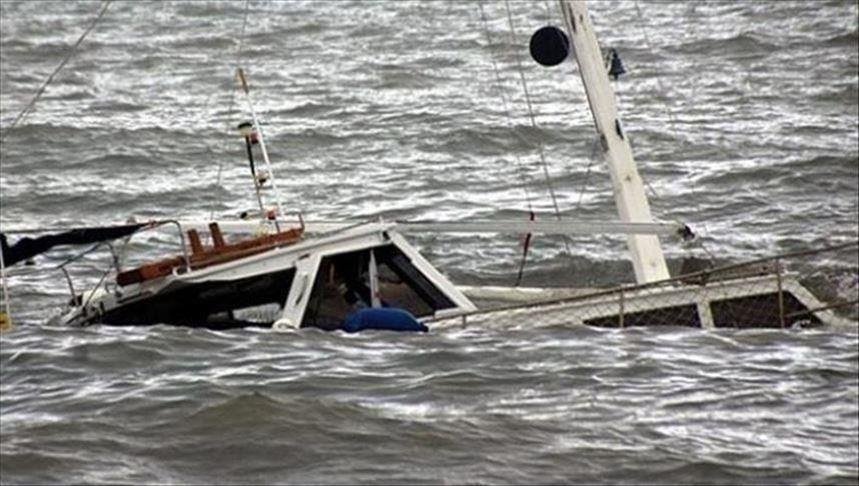From Abuja, the nation’s federal capital, to Lagos, Nigeria’s commercial nerve centre, reports have uncovered how poor sanitation fuels disease outbreaks, endangers lives, and exposes systemic failures in waste management and urban planning.
In this special report therefore, Juliet Jacob takes viewers into the heart of Nigeria’s growing public health emergency—where piles of uncollected waste, clogged drainage systems, and contaminated water sources are not just eyesores but ticking time bombs.

Lagos Gutters and the National Shame
From clogged gutters in Ajegunle to faeces-laced sidewalks in Agege, Nigeria’s sanitation crisis is visible in the daily lives of millions. In Lagos—the country’s commercial nerve center—open defecation is no longer a rural problem; it’s a harsh urban reality. Despite being a megacity, Lagos remains one of many Nigerian states battling the deadly consequences of poor waste disposal and inadequate toilets.
But the filth isn’t confined to the southwest. In Abuja, piles of uncollected garbage fester under the bridges in Nyanya, sewage runs freely through parts of Karu, and makeshift dumpsites sprawl across Jabi and Gwagwalada.
Overflowing refuse bins, blocked drainage channels, and the stench of untreated sewage are constant features in many neighborhoods, contributing to the spread of diseases like cholera, typhoid, and dysentery.
The lack of functional public toilets and the failure of waste management systems not only pose a health hazard but also reflect deep-rooted governance and infrastructural failures.
Overflowing Waste and Health Risks in FCT
Poor sanitation and dirty streets remain a significant challenge in various parts of the Federal Capital Territory (FCT), particularly in densely populated areas where waste disposal systems are inadequate.
Accumulation of refuse on roadsides, clogged drainage channels, and improper waste management contribute to unhealthy living conditions, increasing the risk of disease outbreaks such as cholera and malaria.

A recent visit to the UTC- a popular printing hub in the nation’s capital city, Abuja revealed a lot about the unhealthy condition of the environment and its threatening health risks. Ceaseless stench emits from clogged gutters and refuse dumps almost suffocating the atmosphere.
The lack of regular waste collection and poor public awareness about sanitation practices exacerbate the situation, leaving many neighborhoods overwhelmed by filth and environmental degradation.
Several agencies are mandated to address these sanitation issues in the FCT. The Federal Capital Territory Administration (FCTA), through its Environment Secretariat and the Abuja Environmental Protection Board (AEPB) is primarily responsible for ensuring proper waste collection, street cleaning, and sanitation enforcement.
Additionally, local area councils are expected to coordinate grassroots efforts and mobilize communities toward maintaining cleanliness. Collaboration between these bodies is crucial to improving sanitation standards, but challenges such as inadequate funding, manpower shortages, and poor enforcement hinder their effectiveness. Strengthened policies and community engagement are needed to tackle the persistent problem of dirty streets in the capital territory.
Nigeria Grapples with Deadly Toll of Poor Hygiene
Globally, over 1.6 million people die annually from diseases linked to faecal contamination, highlighting a silent yet devastating global health challenge. But in Nigeria, the statistics are even more alarming: more than 100,000 children under the age of five die each year from preventable diseases such as diarrhea and cholera, primarily caused by unsafe drinking water, poor sanitation, and inadequate hygiene practices.
This public health emergency is worsened by a persistent lack of access to basic sanitation facilities. According to UNICEF, around 47 million Nigerians still practice open defecation, a practice that continues to contaminate water sources and spread disease in both rural and urban communities. Nearly 70% of the population relies on unsafe or untreated water sources, leading to frequent outbreaks of waterborne diseases.
In Bauchi State, one of Nigeria’s most affected regions, the situation is particularly dire. Dr. Mahmud Bose, Director of the Bauchi State Environmental Protection Agency, warns: “We are sitting on a sanitation time bomb.” He notes that with the onset of the rainy season, open defecation and poorly constructed latrines result in faecal matter washing into open water bodies, causing spikes in cholera cases and other infectious diseases.
Public health experts link the crisis to a combination of poverty, insufficient government investment, and poor policy implementation. Despite Nigeria’s 2019 commitment to end open defecation by 2025 through the Clean Nigeria Campaign, progress remains slow. Many communities lack awareness about the dangers of poor hygiene, while others are hampered by a shortage of affordable sanitation infrastructure.
“The government must declare a national emergency on sanitation,” says Chinyere Ugwu, a WASH (Water, Sanitation and Hygiene) specialist with a non-profit organization in Abuja. “We need sustained investment, aggressive public awareness campaigns, and stronger enforcement of environmental laws.”
Children are the most vulnerable. The United Nations estimates that diarrhea alone causes more child deaths in Nigeria than malaria, measles, and HIV/AIDS combined. In overcrowded slums and internally displaced persons (IDP) camps, the lack of clean toilets and safe water continues to endanger lives daily.
Lagos at the Epicenter of Open Defecation
In densely populated neighborhoods like Makoko, Mushin, Ajegunle, and parts of Agege, it’s a common sight to see children squatting beside gutters, defecating directly into open drains. For many residents, especially in informal settlements and overpopulated slums, the lack of access to functional toilets forces them to resort to open spaces or makeshift alternatives.
A 2023 report by WaterAid Nigeria found that over 45% of households in Lagos slums lack access to any kind of toilet facility, including pit latrines.
“Lagos is choking on its own waste,” said Adebayo Aloa, WaterAid’s WASH program lead. “There’s no dignity, no health, and no strategy.”
Despite sustained efforts by the Lagos State Ministry of the Environment and Water Resources — including public sensitization campaigns, the construction of public toilets, and enforcement drives against open defecation — the situation remains largely unchanged.
The root of the problem, experts say, lies in the overwhelming population pressure. With over 20 million residents and thousands arriving daily in search of work and shelter, existing sanitation infrastructure simply cannot keep up.
According to Dr. Hafsat Kalejaiye, a public health expert at the University of Lagos, “The sheer number of people living in substandard housing with no plumbing or sewage systems is staggering. Lagos has become a textbook case of urban sanitation failure.”
In areas like Makoko, built partly on water, toilets are often wooden platforms suspended over the lagoon — a direct channel for human waste into the ecosystem. In other neighborhoods, broken sewage lines, blocked drainage, and illegal waste disposal compound the crisis.
Government officials acknowledge the challenge but point to resource constraints. “We are committed to eliminating open defecation, but we also need massive federal support and community involvement,” said Mrs. Folasade Adebayo, a spokesperson for the Lagos State Ministry of the Environment. “The pace of urban migration is simply outstripping our efforts.”
Meanwhile, cholera outbreaks and other waterborne diseases continue to plague the most vulnerable communities, especially during the rainy season when floodwaters mix with faecal matter. Without rapid, coordinated action — including large-scale investments in sanitation infrastructure and slum upgrading — Lagos risks becoming an epicenter of preventable disease.
The Real Human Cost
“The drainage in my street is full of poop. During the rains, it floods into our compound,” lamented Iyabo Salami, a mother of three in Bariga. Last year, her youngest child was hospitalized for a week after contracting typhoid. She’s not alone—WaterAid estimates that 90% of diarrhea-related deaths in Nigeria are preventable with clean water and sanitation. Yet, deaths persist.
In densely populated neighborhoods like Ajegunle, Makoko, and Bariga, blocked sewers, open defecation, and broken water systems are daily realities, exposing thousands to cholera, dysentery, and other waterborne diseases. Despite government promises and sporadic interventions, the infrastructure remains grossly inadequate, leaving families like Iyabo’s to fend for themselves with sachet water and improvised soakaways as survival tools in an ongoing public health crisis.
Cholera Outbreaks: A Tragic Cycle
The 2021 cholera outbreak that began in Niger State and swept through to Lagos by 2024 left over 600 people dead and thousands hospitalized, with vulnerable communities in densely populated areas like Ajegunle, Mushin, and Agege worst affected. Health workers battled severe shortages of rehydration salts, clean water, and medical supplies, while overwhelmed hospitals turned patients away.
Investigations revealed that years of underinvestment in sanitation infrastructure and erratic waste management worsened the crisis. Despite repeated government promises, many boreholes remained unsafe, and drainage systems were clogged. Dr. Halima Danjuma added, “Until we stop reacting only when bodies pile up, this deadly cycle will continue every rainy season.”
The Sanitation Economy Bleeds
Nigeria is losing over ₦455 billion every year—about 1.3% of its GDP—due to the devastating impact of poor sanitation, which continues to drain the economy through preventable diseases, reduced productivity, and high mortality rates.
“When you consider lost man-hours, hospital bills, and child mortality, the cost is unthinkable,” said Dr. John Ikenna, a public health economist, emphasizing that the economic implications stretch far beyond healthcare expenses.
“Yet we treat sanitation as an afterthought, instead of a foundational public service,” he added, lamenting the chronic underinvestment in water, sanitation, and hygiene (WASH) infrastructure.
Experts warn that without urgent reforms and sustainable policies, the sanitation crisis will continue to erode public health gains, perpetuate poverty, and hinder national development, especially in underserved communities where open defecation and lack of clean water remain rampant.
The Forgotten Sanitation Workers
Behind the scenes are the unsung heroes: manual pit emptiers and sewage handlers. Many work without gloves or boots, exposed to pathogens and toxic gases.
Sanitation consultant Muhammad Usman said, “These workers risk their lives daily. There must be regulation, training, and safety equipment as a matter of law.”
A pit emptying supervisor in Lagos, Tunde Balogun, lamented, “Sometimes we use our bare hands. We don’t have a choice if the machine breaks down.” Similarly, health officer Rebecca Idoko emphasized, “Without proper gear, they face infections, respiratory problems, and even death. It’s a public health emergency that must be addressed.”
Despite their critical role in urban sanitation, these workers are often ignored in policy discussions. “We are treated like we don’t matter,” said Musa Ibrahim, a pit emptier in Kano. “But without us, the cities would drown in filth.” Their voices, though rarely heard, echo a common plea—for dignity, protection, and recognition.
Turning Faeces Into Fuel
A bright spot has emerged from Bauchi, where the WODASS initiative now converts faecal sludge into biogas and energy briquettes. The pilot project, backed by BASEPA and WaterAid, has reduced open defecation in three communities.
“It’s a circular solution—cleaner fuel, safer streets, and income generation,” said Hauwa Bello, WODASS coordinator. According to community leader Malam Ibrahim Adamu, “Before this, our environment was polluted and unhealthy. Now, people see waste as a resource.”
Women have also found empowerment through the initiative, with Fatima Sani, a local beneficiary, noting, “I never imagined I could earn money from waste. This has changed my life and my family’s future.” The success of the project has sparked interest in replicating the model in neighboring states.
The Policy Vacuum
The Nigerian government declared war on open defecation in 2019 with the “Clean Nigeria: Use the Toilet” campaign. But six years later, only 78 out of 774 local governments have achieved open defecation-free status.
WASH analyst Ngozi Obasi blames the failure on weak enforcement. “What we have is a declaration, not a plan. States must fund and track implementation.”
According to rural development advocate Sani Dauda, “In many villages, there are no toilets, no awareness, and no budget. People are left to fend for themselves.”
A local government official in Kogi, Aisha Mohammed, added, “We want to end open defecation, but we’re working without support from the state. It’s frustrating.”
The gap between policy and practice continues to undermine progress, especially in underserved communities where infrastructure and behavior change campaigns are urgently needed.
Education and Enforcement Go Hand in Hand
Changing behavior starts with community awareness. In Osun and Ekiti States, community-led sanitation programs have shown success by pairing enforcement with education.
“When people understand the health link, they change,” noted Bamidele Akande, a community WASH educator. “But they need toilets to switch to.” Local leaders have played a crucial role by championing clean environment campaigns and ensuring that facilities are in place.
“We can’t just tell people to stop open defecation—we must provide alternatives,” emphasized Chief Ronke Alabi, a traditional leader in Ekiti. “Once public toilets were built, usage increased and health outcomes improved,” she added, pointing to a recent drop in waterborne illnesses in her community.
Experts urge urgent investment in public toilets, waste treatment plants, and sanitation-focused urban design. Lagos, with its 20 million residents, has fewer than 500 functional public toilets. “We need toilets in markets, parks, bus stops—everywhere people go,” said urban planner Ifeoma Onoh. “Without it, we’re recycling disease.”
Toilets, Not Talk, Flush the Excuses
Nigeria’s sanitation crisis is not a mystery—it’s a missed opportunity. Experts have laid out clear, practical steps: enforce toilets in all new housing, subsidize toilet construction for the poor, implement routine waste management in every LGA, protect sanitation workers, and harness public-private partnerships to build sustainable infrastructure. “Nigeria doesn’t lack solutions,” says WASH consultant Tunde Olagunju. “We lack urgency and discipline.”
Every day that action is delayed, lives are lost, streets overflow, and economic potential drains away. The tools to fix this mess are already in hand; experts say what’s missing is the political will and public commitment.
As Prof. Nwosu puts it, “A clean Nigeria isn’t a luxury—it’s a necessity.” Sanitation must be seen not as charity, but as a basic right. Until then, the cost will be measured in lives, not just latrines.



